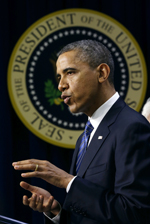TOKYO - President Barack Obama arrived in Japan on Wednesday to start a four-country tour of Asia aimed at advancing a Pacific-nations trade pact and reassuring allies that the U.S. will back their security interests, including in territorial disputes with China.
Obama met Prime Minister Shinzo Abe outside the Sukiyabashi Jiro restaurant in Tokyo’s Ginza area ahead of a private dinner. The itinerary of Obama’s third visit to Japan as president includes a summit and news conference with Abe, a state dinner with the Imperial family, a tour of Tokyo’s Meiji Shrine, and a meeting with business executives.
“Our engagement with China does not and will not come at the expense of Japan or any other ally,” Obama said in an interview with the Yomiuri Shimbun newspaper, published hours before he arrived.
Obama also will visit South Korea, Malaysia and the Philippines, returning to Washington on Tuesday.
Japan and the United States were not set to announce a breakthrough in talks on the 12-nation Trans-Pacific Partnership, as differences over Japanese beef and pork tariffs and the auto industry impede an agreement.
At a new conference in Tokyo today, Obama rejected suggestions that the Trans-Pacific Partnership is in danger, despite disagreements with Japan and opposition from Obama’s Democratic allies in Congress.
Obama also is urging Japan and South Korea to improve relations and seeking to coordinate with Abe on ways to ease tensions over disputed islands in the East China Sea, called Senkaku in Japanese and Diaoyu in Chinese.
The U.S. recognizes Japan as the sole administrator of the unpopulated islands, which China has challenged through the positioning of ships and flying of surveillance aircraft, escalating military tensions. In November, China declared an air-defense identification zone over a large part of the East China Sea. Japan on Saturday broke ground on a new radar base on its westernmost island to improve surveillance in the area.
Obama reiterated the U.S. position in the Yomiuri Shimbun interview, saying it “is clear - the Senkaku Islands are administered by Japan and therefore fall within the scope of Article 5 of the U.S.-Japan Treaty of Mutual Cooperation and Security. And we oppose any unilateral attempts to undermine Japan’s administration of these islands.”
China has signaled a strong stance in territorial disputes in both the East China Sea and South China Sea. The Philippines last month challenged China’s assertions to much of the South China Sea, submitting a claim for arbitration to a United Nations tribunal.
The U.S. should be discreet in “word and deed and play a constructive role” in the East China Sea dispute, Chinese Foreign Ministry spokesman Qin Gang said Wednesday in Beijing.
“The so-called U.S.-Japan alliance is a bilateral agreement forged in the Cold War era and should not undermine China’s territorial sovereignty and legitimate rights and interests,” Qin said. “We are firmly opposed to the Diaoyu Islands being put under the U.S.-Japan treaty.”
Also today, Obama said Russia has not abided by the spirit or the letter of an agreement reached in Geneva last week that aimed to ease tensions in eastern Ukraine. He said Russia has not stepped in to halt aggressive moves by pro-Russian insurgents in eastern Ukraine and that new sanctions against Russia are “teed up.”
Obama said North Korea and its nuclear program comprise the most destabilizing situation in the Asia-Pacific region.
Information for this article was contributed by Margaret Talev, Phil Mattingly, Masaaki Iwamoto and Daryl Loo of Bloomberg News and by Julie Pace and staff members of The Associated Press.
Front Section, Pages 6 on 04/24/2014
